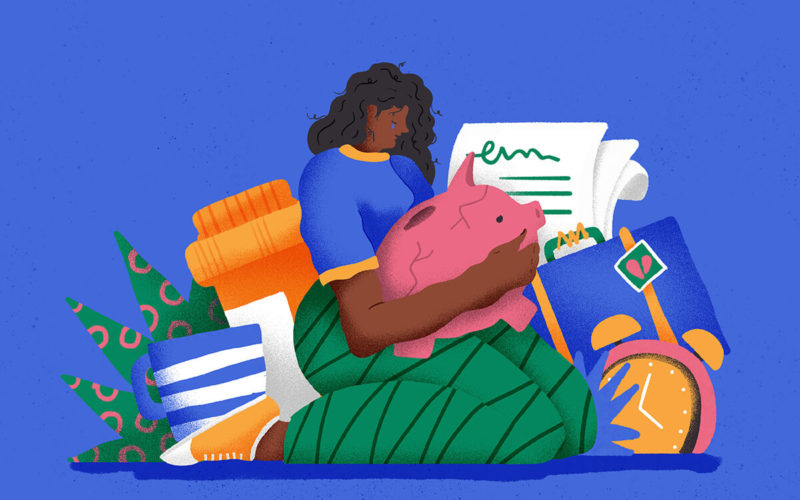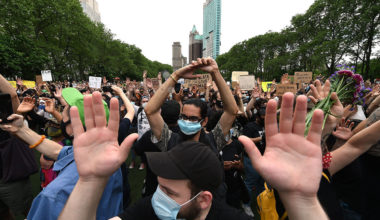On TV, the plot looks something like this: a woman is raped or abused. She is a sympathetic character, traumatized yet brave. She reports the crime to the police, who perform a detailed forensic investigation and arrest the perpetrator. A trial ensues, and the survivor steps forward to tell her story. She wins over the jury, and the perpetrator is sentenced to years in jail.
Sometimes, life comes close to this narrative. In 2016, for example, the survivor of the Stanford rape case authored a powerful victim impact statement that captured the country’s attention and, undoubtedly, helped ensure jailtime for the perpetrator.
But most of the time, for most survivors, reality looks quite different than Law and Order, SVU. The vast majority — 69% — of sexual assaults go unreported to the police, and only 0.7% of all sexual assaults result in a conviction.
Meanwhile, the effects of an assault linger, with three-quarters of sexual assault survivors reporting substantial ensuing problems in school or work, and with friends or family. Survivors of sexual violence are more likely to be diagnosed with anxiety disorders, depression, eating disorders, and PTSD. This is particularly serious for young women: Up to 80% of teenage girls who are sexually assaulted experience destabilizing psychological effects.
“When a victim is victimized so many parts of their life fall apart,” says Colby Bruno, Senior Legal Counsel at the Victims Rights Law Center, a Boston-based legal nonprofit that serves survivors of sexual assault.
How do we solve this mismatch between the scope of the problem of sexual assault, and the criminal justice system’s ability to truly bring justice?
Justice Goes Beyond Jails
Some legal experts, like Bruno, argue that ramped up enforcement would go a long way to reduce sexual violence. “I think we need better prosecution,” Bruno says. “I think we need deterrence to make sure it doesn’t happen again.”
Others, like Leigh Goodmark, Professor of Law and Co-Director of the Clinical Law Program at the University of Maryland, believe that a criminal justice system plagued by racism and socioeconomic inequality is ultimately unjust for both perpetrators and victims. “It doesn’t give you money to lean on, it doesn’t give you job training, it doesn’t give anything people might need to rearrange their lives,” Goodmark told Talkspace in a previous interview.
But there’s something most advocates can agree on: sexual assault survivors need far more support than they currently receive.
For the past few decades, there’s been a movement within legal and victims’ advocate communities to fill in that gap. While data are hard to track, anecdotal reports from lawyers suggest that recently, survivors of sexual violence have increasingly opted to pursue civil, rather than or in addition to criminal, legal remedies. These solutions can take place anywhere from University Title IX committees to small claims court. They can include filing a case to get out of a lease in order to move away from an abuser, or directly suing a rapist for monetary damages in order to pay for health care
These solutions have one thing in common: the belief that when it comes to justice for sexual assault, survivors’ physical and emotional needs should come first.
Rape is an Economic Crime
“I’ve always thought my research was just so logical,” says Rebecca Loya, a Senior Research Associate at Brandeis University, who studies the economic effects of sexual violence on survivors. “But strangely enough, it’s not something that people have paid much attention to.”
Considering the devastating impacts sexual violence can have on survivors’ economic wellbeing, Loya is right to be surprised. The CDC estimates that between physical and mental healthcare costs, housing instability, and lost productivity at work, rape costs each survivor an average of $122,461 over their lifetime.
Sexual assault happens to everyone, it doesn’t matter if you’re rich or poor, it doesn’t matter race or ethnicity. But recovery doesn’t look the same for everyone.
Rebecca Loya, Senior Research Associate
Economic impact of assault
Often, sexual assault can render it impossible for survivors to continue their work, for a while or forever. “People need time off to recover,” says Loya, whether that be short-term recovery or for an extended period due to long-term effects, like PTSD. “For survivors who don’t have paid time off or stable employment, that can be very costly.” Over time, this instability can lead to job loss and even homelessness.
This is especially true for low-income survivors, who may already be struggling to access the basic resources they need. “Sexual assault happens to everyone, it doesn’t matter if you’re rich or poor, it doesn’t matter race or ethnicity” says Loya. “But recovery doesn’t look the same for everyone.”
Because sexual assault survivors are still plagued by stigma, survivors themselves may be unable to connect the dots between an assault and the resulting negative life experiences. Multiple survivors told Loya they’d never realized how deeply the assault had affected their lives. This is often exacerbated by a lack of community support. “Society, employers, family, loved ones said ‘This is one thing that happened to you, get over it,’” says Loya. “They don’t see that this is something that’s going to take years to work your way out of.”
Mental Health Impacts of Assault
Trauma from sexual violence has long-lasting mental health impacts, and this further compounds survivors’ economic and social vulnerability.
To begin with, poverty already drastically increases the likelihood that someone will be sexually assaulted, with the poorest Americans 12 times more likely to be victimized than the wealthiest. People in poverty are also more likely to experience mental illness, due to stressors like food insecurity, racial discrimination, or lack of access to care. And mental illness itself is a risk factor for sexual victimization, as people with mental illness are as much as 15 times more likely to be sexually assaulted.
For many survivors, especially low-income women, these factors lead to a vicious cycle, wherein low-income women or people with mental illness are more likely to be sexual victimized and less likely to be able to access care. That’s why many advocates say supporting victims is the first and best way forward.
The Law Can Help
About twenty years ago, Colby Bruno was working at a large law firm in Boston when she began volunteering with the Victim Rights Law Center to provide free legal services to sexual assault survivors seeking restraining orders. That volunteer work became a full-time mission, and she joined the Victim Rights Law Center as an attorney in 2003.
As opposed to criminal lawyers, who focus on convicting assailants in court, people like Bruno use civil law to help connect victims to crucial services. “The two most common ones that we end up dealing with are privacy and safety,” says Bruno. This can include helping survivors keep their medical records private, helping them obtain leave from their jobs, breaking a lease in order to move away from an assailant, and advocating for universities to remove assailants from their classes or dorms.
Civil and small claims courts
Survivors who wish to hold perpetrators responsible for costs like physical and mental health care can turn to small claims court. These sums can be relatively small — say, $2,000 to cover therapy for six months — but they can make a significant difference, allowing someone to remain in their housing, access care, and begin to heal.
Survivors can also sue perpetrators to recover larger sums of money, covering not just medical expenses but also emotional damages. Civil courts have lower burdens of proof than criminal courts, making this route potentially more satisfying and less traumatizing for victims.
Barriers to Justice
There’s a convincing moral argument for perpetrators covering survivors’ costs. After all, taking responsibility for a crime shouldn’t only, or even primarily, mean accepting punishment — it should also mean doing whatever it takes to help undo harm. “To the extent that people are identified and able to pay, 100% they should,” says Loya.
But there are substantial barriers to pursuing justice through civil courts. “It’s a very big uphill battle for victims,” says Bruno. “Most victims don’t ever want to see the perpetrator again,” which is required in small claims court. Then, many survivors are reluctant to tell others they’ve been assaulted, and may not be supported even if they do open up. Even if survivors do choose to sue assailants, there’s no guarantee that a perpetrator will even have the financial resources to cover the suit.
Finally, there’s a more crucial barrier that prevents many, if not most, sexual assault survivors from initiating civil suits: “It takes money,” Loya says.
Changing the Script
With such high barriers to both civil and criminal action against assailants, how can we ensure that survivors get the help they need?
For Loya, truly prioritizing survivors means moving beyond a conception of rape as a strictly individual crime, and choosing instead to make society as a whole more supportive. This means investing in survivors whose preexisting economic insecurity makes them more vulnerable to the traumatic effects of rape. “Public policies could come in and play the role that family plays for richer people or people who have more resources,” Loya says.
That investment can and should take the form of affordable mental health support for survivors. Research has shown that survivor empowerment, including mental healthcare, can help prevent revictimization and longer-lasting effects, like PTSD. But less than half of people who need therapy have access to it, and this is a greater problem for people of color and low-income people.
Many organizations, like the Rape, Incest, and Abuse National Network, and The National Domestic Violence Hotline, can help connect survivors to local or online, free- or low-cost mental health resources. Meanwhile, advocates like Bruno and the attorneys at the Victims Rights Law Center can help survivors pursue civil legal remedies to get support.
Ultimately, the question isn’t strictly about whether perpetrators should pay for survivors’ care. It’s about how we, as a society, support survivors of sexual assault. Getting early help can make all the difference between being completely knocked off course by an assault, and having the resources to be resilient and heal. Whether the support comes from the individual assailant — or, preferably, society as a whole — that act of care can make all the difference.
So to truly support survivors, says Bruno, “we really need to be better about investing in people’s recovery.”
Talkspace articles are written by experienced mental health-wellness contributors; they are grounded in scientific research and evidence-based practices. Articles are extensively reviewed by our team of clinical experts (therapists and psychiatrists of various specialties) to ensure content is accurate and on par with current industry standards.
Our goal at Talkspace is to provide the most up-to-date, valuable, and objective information on mental health-related topics in order to help readers make informed decisions.
Articles contain trusted third-party sources that are either directly linked to in the text or listed at the bottom to take readers directly to the source.




